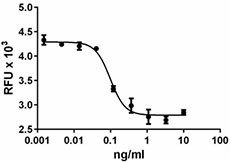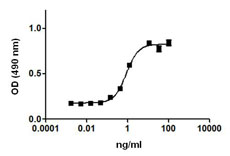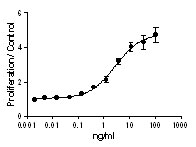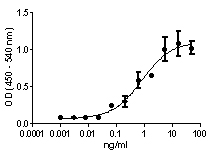- Regulatory Status
- RUO
- Other Names
- CED, DPD1, TGFB, TGFbeta, TGFB1
- Ave. Rating
- Submit a Review
- Product Citations
- publications

-

Mouse TGF-β1 inhibits the proliferation of HT-2 cells induced by mouse IL-4.
| Cat # | Size | Price | Quantity Check Availability | Save | ||
|---|---|---|---|---|---|---|
| 763102 | 10 µg | 223 CHF | ||||
| 763104 | 25 µg | 347 CHF | ||||
TGF-β1 is synthesized in cells as a 390-amino acid protein. Furin cleaves the protein at residue 278, yielding an N-terminal cleavage product which corresponds to the latency-associated peptide (LAP), and the 25 kD C-terminal portion of the precursor constitutes the mature TGF-β1. In addition to furin, some other activators can release TGF-β from LAP. TGF-β activators include proteases that degrade LAP, thrombospondin-1, reactive oxygen species, and the integrins αvβ6 and αvβ8. TGF-β is involved in regulating homeostasis of different Treg populations (naïve, inducible, peripheral) in both mouse and humans, although its specific roles remain the subject of active investigation. Th17 murine can be induced from naïve CD4+ T cells by the combination of TGF-β1 and IL-6 or IL-21. Nevertheless, the regulation of human Th17 differentiation is distinct. TGF-β1 seems to have dual effects on human Th17 differentiation in a dose-dependent manner. While TGF-β1 is required for the expression of RORct, in human naive CD4+ T cells from cord blood, TGF-β1 can inhibit the function of RORct at high doses. By using serum-free medium, it has been clarified that the optimum conditions for human Th17 differentiation are TGF-β1, IL-1β, and IL-2 in combination with IL-6, IL-21 or IL-23.
Product DetailsProduct Details
- Source
- Mouse TGF-β1, amino acids (Ala279-Ser390) (Accession # NP_035707) was expressed in CHO cells.
- Molecular Mass
- The 112 amino acid recombinant protein has a predicted molecular mass of approximately 12.8kD. The DTT-reduced and non-reduced protein migrate at approximately 12.5 kD and 25 kD respectively by SDS-PAGE. The predicted N-terminal amino acid is Ala.
- Purity
- > 95% by SDS-PAGE gel as determined by Coomassie stained SDS-PAGE.
- Formulation
- 0.22 µm filtered protein solution is in 30% Acetonitrile, 0.1% TFA (trifluoroacetic acid).
- Endotoxin Level
- Less than 0.01 ng/ per µg cytokine (0.1 EU/ µg) as determined by the LAL method.
- Concentration
- 10 and 25 µg sizes are bottled at 200 µg/mL.
- Storage & Handling
- Unopened vial can be stored between 2°C and 8°C for up to 2 weeks, at -20°C for up to six months, or at -70°C or colder until the expiration date. For maximum results, quick spin vial prior to opening. The protein can be aliquoted and stored at -20°C or colder. Stock solutions can also be prepared at 50 - 100 µg/mL in appropriate sterile buffer, carrier protein such as 0.2 - 1% BSA or HSA can be added when preparing the stock solution. Aliquots can be stored between 2°C and 8°C for up to one week and stored at -20°C or colder for up to 3 months. Avoid repeated freeze/thaw cycles.
- Recommended Usage
-
Bioassay
- Application Notes
-
BioLegend carrier-free recombinant proteins provided in liquid format are shipped on blue-ice. Our comparison testing data indicates that when handled and stored as recommended, the liquid format has equal or better stability and shelf-life compared to commercially available lyophilized proteins after reconstitution. Our liquid proteins are verified in-house to maintain activity after shipping on blue ice and are backed by our 100% satisfaction guarantee. If you have any concerns, contact us at tech@biolegend.com.
- Product Citations
-
Antigen Details
- Structure
- Dimer.
- Distribution
-
TGF-β1 is secreted by numerous cells such as mesenchymal cells.
- Function
- Regulation of cell growth and survival, cell and tissue differentiation, development, inflammation, immunity, hematopoiesis, and tissue remodeling and repair. Essential for wound healing, stimulates matrix molecule deposition and angiogenesis, and essential mediator of the pathologic scarring in fibrotic disorders.
- Interaction
- Endothelial cells, mesenchymal cells, T cell, monocytes, and macrophages.
- Ligand/Receptor
- TGF-β1 binds to type II and type I serine/threonine kinase receptors, which initiate intracellular signals through activation of Smad proteins.
- Bioactivity
- Mouse TGF-β1 inhibits the proliferation of HT-2 cells induced by mouse IL-4. The ED50 = 0.05 — 0.25 ng/ml.
- Cell Type
- Embryonic Stem Cells, Mesenchymal Stem Cells, Neural Stem Cells
- Biology Area
- Apoptosis/Tumor Suppressors/Cell Death, Cell Biology, Immunology, Stem Cells
- Molecular Family
- Cytokines/Chemokines, Growth Factors
- Gene ID
- 21803 View all products for this Gene ID
- UniProt
- View information about TGF-beta1 on UniProt.org
Related FAQs
- Why choose BioLegend recombinant proteins?
-
• Each lot of product is quality-tested for bioactivity as indicated on the data sheet.
• Greater than 95% Purity or higher, tested on every lot of product.
• 100% Satisfaction Guarantee for quality performance, stability, and consistency.
• Ready-to-use liquid format saves time and reduces challenges associated with reconstitution.
• Bulk and customization available. Contact us.
• Learn more about our Recombinant Proteins. - How does the activity of your recombinant proteins compare to competitors?
-
We quality control each and every lot of recombinant protein. Not only do we check its bioactivity, but we also compare it against other commercially available recombinant proteins. We make sure each recombinant protein’s activity is at least as good as or better than the competition’s. In order to provide you with the best possible product, we ensure that our testing process is rigorous and thorough. If you’re curious and eager to make the switch to BioLegend recombinants, contact your sales representative today!
- What is the specific activity or ED50 of my recombinant protein?
-
The specific activity range of the protein is indicated on the product datasheets. Because the exact activity values on a per unit basis can largely fluctuate depending on a number of factors, including the nature of the assay, cell density, age of cells/passage number, culture media used, and end user technique, the specific activity is best defined as a range and we guarantee the specific activity of all our lots will be within the range indicated on the datasheet. Please note this only applies to recombinants labeled for use in bioassays. ELISA standard recombinant proteins are not recommended for bioassay usage as they are not tested for these applications.
- Have your recombinants been tested for stability?
-
Our testing shows that the recombinant proteins are able to withstand room temperature for a week without losing activity. In addition the recombinant proteins were also found to withstand four cycles of freeze and thaw without losing activity.
- Does specific activity of a recombinant protein vary between lots?
-
Specific activity will vary for each lot and for the type of experiment that is done to validate it, but all passed lots will have activity within the established ED50 range for the product and we guarantee that our products will have lot-to-lot consistency. Please conduct an experiment-specific validation to find the optimal ED50 for your system.
- How do you convert activity as an ED50 in ng/ml to a specific activity in Units/mg?
-
Use formula Specific activity (Units/mg) = 10^6/ ED50 (ng/mL)

 Login / Register
Login / Register 












Follow Us